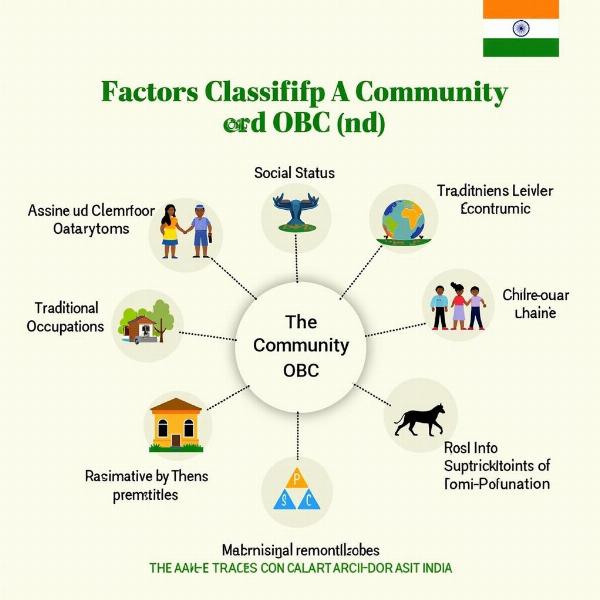Understanding the meaning of “Other Backward Class” (OBC) is crucial for navigating India’s social and political landscape. This term, frequently encountered in discussions about reservations and social justice, refers to a historically disadvantaged group in India. The term “Other Backward Class” in Hindi is commonly translated as “अन्य पिछड़ा वर्ग” (Any Pichda Varg). This article will delve into the meaning, implications, and significance of the term, providing a comprehensive understanding of its historical context and current relevance.
Defining Other Backward Class (OBC)
The term “Other Backward Class” encompasses a diverse range of castes and communities in India that have faced social and educational disadvantages historically. These groups are considered to be socially and economically backward compared to the “forward castes.” The Indian government identifies and classifies these groups based on various social, educational, and economic indicators. The purpose of this classification is to implement affirmative action policies like reservations in education and employment, aiming to uplift these communities and promote social equality. The identification of OBCs is a dynamic process, with revisions and additions made periodically based on evolving socio-economic realities.
Historical Context of OBCs
The concept of OBCs emerged during the British colonial era, as administrators attempted to categorize and understand the complex caste system in India. Initially, the focus was primarily on caste-based hierarchies. However, post-independence India saw a shift towards recognizing social and educational backwardness as key criteria for OBC classification. The Mandal Commission, established in 1979, played a pivotal role in identifying and recommending reservations for OBCs. This led to significant social and political changes in India.
Criteria for OBC Classification
The criteria for classifying a group as OBC are multi-faceted and involve assessing various factors. These include social status, traditional occupation, educational levels, and economic conditions. The process often involves extensive surveys and data collection to determine the relative backwardness of different communities. While caste remains a significant factor, it is not the sole determinant. The government also considers factors like representation in government services and access to resources.
 OBC Classification Criteria in India
OBC Classification Criteria in India
Significance of OBC Reservations
Reservations for OBCs in education and government jobs are a key element of India’s affirmative action policy. These reservations aim to address historical disadvantages and provide opportunities for OBC communities to access higher education and employment. The goal is to empower these communities and promote their representation in various spheres of life, contributing to greater social equity and inclusion. reservation in hindi meaning This has been a subject of ongoing debate and discussion, with various perspectives on its effectiveness and implications.
Challenges and Future Directions
While OBC reservations have played a significant role in social upliftment, several challenges remain. These include ensuring accurate identification of OBC communities, addressing the creamy layer issue (excluding affluent members within OBCs from reservations), and promoting inclusive growth that benefits all sections of society. The future of OBC policy lies in finding a balance between addressing historical injustices and fostering a society based on equal opportunity. marginalized groups meaning in hindi This requires continuous dialogue, review, and adaptation of policies to meet the evolving needs of OBC communities.
Conclusion
The term “Other Backward Class” (अन्य पिछड़ा वर्ग) represents a significant aspect of India’s social fabric. Understanding its meaning, history, and implications is crucial for anyone seeking to grasp the complexities of Indian society. The ongoing dialogue surrounding OBC classification and reservation policies reflects the nation’s commitment to social justice and inclusive development. backward class certificate meaning in hindi The quest for a more equitable and just society requires continuous efforts to empower and uplift OBC communities, ensuring their full participation in the nation’s progress.
FAQ
- What does OBC stand for? OBC stands for Other Backward Class.
- What is the Hindi translation of OBC? The Hindi translation of OBC is अन्य पिछड़ा वर्ग (Any Pichda Varg).
- Who are considered OBCs? OBCs are communities identified by the Indian government as socially and educationally backward.
- Why are there reservations for OBCs? Reservations aim to address historical disadvantages and promote social equality.
- What are the criteria for OBC classification? Criteria include social status, traditional occupation, educational levels, and economic conditions.
Meaning-Hindi.in is your trusted partner for accurate and culturally sensitive Hindi translation services. We specialize in various translation domains, including business, legal, technical, website localization, educational, and specialized content. fee reimbursement meaning in hindi old fashioned meaning in hindi Our expert linguists ensure precise and nuanced translations, catering to the specific needs of our clients. Contact us today for all your Hindi translation requirements at [email protected] or call us at +91 11-4502-7584. Meaning-Hindi.in is dedicated to bridging language barriers and fostering effective communication.